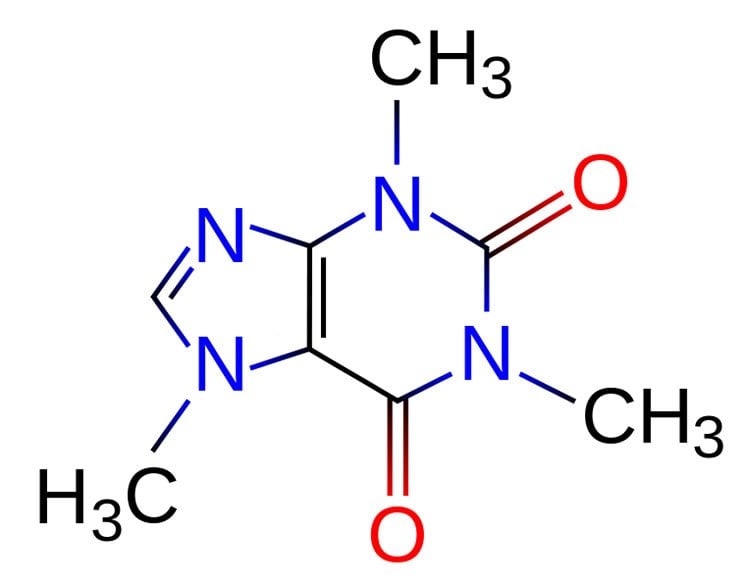Summary: A new study reveals animals injected with caffeine during the last 10 minutes of exposure to general anesthetic woke more quickly than those injected with saline solution. Waking times became significantly quicker with higher doses of caffeine.
Source: American Physiological Society.
Caffeine helps quickly boost wakefulness following general anesthesia, a new study finds. The stimulant—used daily by more than 90 percent of adults in the U.S.—appears to alter physiological function in two different ways to shorten recovery time. The paper, published ahead of print in the Journal of Neurophysiology, was chosen as an APSselect article for August.
Caffeine works in two different ways to wake us up. It raises the body’s level of cyclic adenosine monophosphate (cAMP), a compound that regulates cell function. Previous studies have shown that an increase in cAMP levels speeds up recovery from general anesthesia. Caffeine also acts as an adenosine receptor antagonist. Activity in the nervous system slows down when adenosine binds to its receptors, causing sleepiness. An adenosine receptor antagonist is a substance that prevents adenosine—a compound that controls nerve activity—from binding to its receptors (molecules on the surface of the cells).
Researchers exposed adult rats to a 3 percent concentration of a general anesthetic for one hour to simulate the effects of undergoing a brief surgical procedure. During the last 10 minutes of exposure, the animals received an injection of either caffeine or a saline solution (the control group). The research team administered the tests on two more occasions with increasingly higher doses of caffeine. The caffeine group awoke from anesthesia more quickly than the control group each time. The reduction in waking time became much more significant—up to 55 percent more quickly—with the highest dosage.

To determine exactly how caffeine reduces waking time, the researchers administered additional trials, exposing the rats to another adenosine receptor antagonist (preladenant) or a plant-based supplement in the mint family (forskolin) that, similar to caffeine, elevates cAMP. Both of these agents caused reductions in waking time, but they were not as significant as the caffeine trials, in which both adenosine receptors were blocked and cAMP levels increased. These results suggest that “some of the accelerated recovery from anesthesia produced by caffeine is most likely mediated by block of adenosine receptors, but that elevation of [cAMP] accounts for the majority of the effect,” the research team wrote.
Source: Stacy Brooks – American Physiological Society
Image Source: NeuroscienceNews.com image is in the public domain.
Original Research: Abstract for “Caffeine Accelerates Recovery from General Anesthesia via Multiple Pathways” by Robert Fong, Suhail Khokhar, Atif Newaz Chowdhury, Kelvin G Xie, Josiah Hiu-yuen Wong, Aaron P. Fox, and Zheng Xie in Journal of Neurophysiology. Published online June 28 2017 doi:10.1152/jn.00393.2017
[cbtabs][cbtab title=”MLA”]American Physiological Society “Caffeine Shortens Recovery Time From General Anesthesia.” NeuroscienceNews. NeuroscienceNews, 1 August 2017.
<caffeine-anesthesia-recovery-7212/>.[/cbtab][cbtab title=”APA”]American Physiological Society (2017, August 1). Caffeine Shortens Recovery Time From General Anesthesia. NeuroscienceNew. Retrieved August 1, 2017 from caffeine-anesthesia-recovery-7212/[/cbtab][cbtab title=”Chicago”]American Physiological Society “Caffeine Shortens Recovery Time From General Anesthesia.” caffeine-anesthesia-recovery-7212/ (accessed August 1, 2017).[/cbtab][/cbtabs]
Abstract
Caffeine Accelerates Recovery from General Anesthesia via Multiple Pathways
Various studies have explored different ways to speed emergence from anesthesia. Previously, we have shown that three drugs that elevate intracellular cAMP (forskolin, theophylline and caffeine) accelerate emergence from anesthesia in rats. However, our earlier studies left two main questions unanswered. First, were cAMP elevating drugs effective at all anesthetic concentrations? Second, given that caffeine was the most effective of the drugs tested, why was caffeine more effective than forskolin since both drugs elevate cAMP? In our current study, emergence time from anesthesia was measured in adult rats exposed to 3% isoflurane for 60 minutes. Caffeine dramatically accelerated emergence from anesthesia, even at the high level of anesthetic employed. Caffeine has multiple actions including blockade of adenosine receptors. We show that the selective A2a adenosine receptor antagonist preladenant or the [cAMP]i-elevating drug forskolin, accelerated recovery from anesthesia. When preladenant and forskolin were tested together, the effect on anesthesia recovery time was additive indicating that these drugs operate via different pathways. Furthermore, the combination of preladenant and forskolin was about as effective as caffeine suggesting that both A2A receptor blockade and [cAMP]i elevation play a role in caffeine’s ability to accelerate emergence from anesthesia. Because anesthesia in rodents is thought to be similar to that in humans, these results suggest that caffeine might allow for rapid and uniform emergence from general anesthesia in humans at all anesthetic concentrations and that both the elevation of [cAMP]i and adenosine receptor blockade play a role in this response.
“Caffeine Accelerates Recovery from General Anesthesia via Multiple Pathways” by Robert Fong, Suhail Khokhar, Atif Newaz Chowdhury, Kelvin G Xie, Josiah Hiu-yuen Wong, Aaron P. Fox, and Zheng Xie in Journal of Neurophysiology. Published online June 28 2017 doi:10.1152/jn.00393.2017







